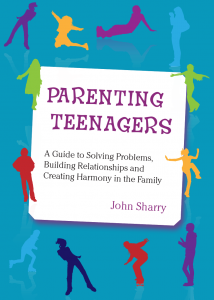 In last week’s article, we considered the experience of becoming a teenager and the often ‘stormy’ consequences for parents and teenagers alike. We emphasised the importance of adopting the right attitude and to see it as much as a time of opportunity as well as a time of challenge. In this second article, we consider how best to respond to the challenges and specifically the importance of an authoritative approach to parenting.
In last week’s article, we considered the experience of becoming a teenager and the often ‘stormy’ consequences for parents and teenagers alike. We emphasised the importance of adopting the right attitude and to see it as much as a time of opportunity as well as a time of challenge. In this second article, we consider how best to respond to the challenges and specifically the importance of an authoritative approach to parenting.
When facing the crisis of the teenage years, many parents react by trying to take control. They may become very strict, and battle with their teenagers to ensure they tow the line. Alternatively, parents may avoid their teenagers’ problems and back down from every conflict, effectively giving up at trying to influence their teenagers or to be involved in their lives.
Both these approaches are problematic: the teenager with very strict parents may rebel even more strongly, escalating the conflict, or they may go ‘underground’ with their problems, hiding more things from their parents. The teenager with permissive parents may feel uncared for and neglected and, without parental supervision, get involved in out-of-control and unsafe behaviours. Both approaches rob teenagers of having involved parents who can support them through the difficulties they face.
The key to successfully parenting children and teenagers is to adopt a balanced authoritative approach. This means that you work hard at staying supportively involved in your teenagers’ lives while also being prepared to be ‘the parent’ and to set and enforce rules and boundaries as needed. As an authoritative parent you try to remain close to your teenagers but you don’t become a peer and always have an authority that allows you to act in their best interest (though it may be very unpopular at times).
This authoritative parenting style ( as opposed to over permissive or over controlling styles) is most associated with the long-term parenting goal of helping teenagers grow into confident adults who are separate and independent but also appropriately connected to their family and able to form their own intimate relationships in the future.
Often the challenge as your child becomes a teenager is to remain connected with them. Teenagers tend to move away from their parents and a generation gap might emerge as you feel you have less in common than before. Generally, you have to work harder to build your relationship with your teenager and in many cases, you have to change the way you related when they were younger. The key is to accept that they are growing up and may have different views and interests to you. It is essential that you listen and try to understand what concerns them most.
Simple changes can make enormous differences to relationships. For example, instead of criticising your son’s choice of music or going on about how much you don’t like the ‘morals’ of the soap opera your daughter watches, why not take a moment to listen to your son’s music and appreciate what he likes about it or why not watch the soap opera with your daughter, listen to her point of view and debate the issues that arise with her.
Equally important is to make sure you have a regular and ideally daily ‘check in’ or time to chat with your teenager. Of course, this is hard with busy parents and teenagers and it is often about making the most of the times you do have, whether this is during the car journey to school, at mealtimes, just before they go to bed etc.
The crucial thing is to be present and available to listen when your teen is most open and most likely to want to talk to you. This might mean putting the newspaper down when they come in from school or making sure you are listening when you drive them to an activity or being open late at night when they tend to be a bit more chatty. Keeping the lines of communication open in ordinary ways makes all the difference.
The second part of authoritative parenting is about being able to be an authority to your teenagers, to set rules and boundaries and to work hard to teach them responsibility. A key aspect of rules for older children and teenagers is the importance of negotiation and communication. Important rules are best not simply imposed but negotiated and talked through. You need to be clear what is the essential to you as the parent (such as your child being safe when out or being respectful at home) but also to listen to and understand what your teenager needs and wants. Then you are in a position to negotiate a compromise.
For example, your son may want to go out to town, but you insist on him being taken there and collected to ensure he is safe. Once an agreement is made you need to make sure it is kept or to impose a consequence if it is not. For example, if he does not keep the rule about coming in on time, he does not go out for the rest of the week. Even when a consequence is imposed you always make sure to talk through what has happened so everyone learns.
In the long term, you want to ensure your child can be responsible for themselves and it is the process of communication, negotiation, and following through on agreements that teaches them how to do this.
Prof. John Sharry, Irish Times, September 2009. John writes in the Irish Times Health+ every Tuesday. Read PART ONE of this series.
